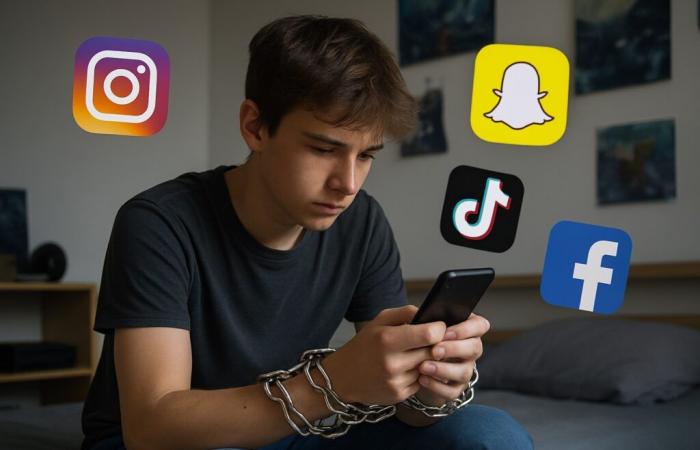There was a time when children dreamed of becoming a teacher, surgeon or astronaut. Today many of them aspire to become influencers on social networks. Far from creating a link, these platforms enclose teens in digital bubbles, distance them from reality and generate a dependence sometimes more powerful than that induced by the traffic of a dealer of a northern district of Marseille.
By Jean-Paul Briand.
This addiction to social networks is skilfully orchestrated. Fucked by algorithms designed to maximize commitment and dependence, it acts as a digital self-service dopamine. The content, accessible 24 hours a day, are accompanied by notifications which constantly remind the user that its value is measured by the number of “likes”, comments and views it generates.
A silent loneliness epidemic
It seems that youth live in the era of communication. Fake. She lives in the era of connection, which has nothing to do with it. Teens spend part of their lives “interacting” with profiles, avatars, pseudos, not with humans. They no longer speak. They send “posts” to a forum or blog. This deleterious digital dependence now encroaches on essential activities such as sleep, physical exercise and authentic social interactions.
A team of sociologists and psychologists from the Baylor University in Texas, has just published its work. They demonstrate that there are, in the general population but especially in the youngest, a significant link between the use of social media and the feeling of loneliness. The researchers, who have studied for three years nearly 7,000 regular social media users, speak of an authentic and silent ” Solitude epidemic »Impacting the mental health of the youngest, whatever the quality of the exchanges.
Whether Facebook, Reddit, X (ex Twitter), YouTube, Instagram, Snapchat, Tiktok and many others, these platforms hire engineers to constantly force “scroller”. Their concern is certainly not the protection of the mental health of minors. Web giants have nothing to do with adolescent ill-being as long as it increases the viewing rate and fills their funds. The discomfort of a 14-year-old teenager does not prevent him from suffering the pub for last mode sneakers or for an ultra-violent video game, quite the contrary.
A distrust of scientific knowledge
What about parents? And the state? What about school? Are they all overwhelmed, blind, too busy or accomplices? Tiktok and others have become parallel classrooms where confounding disinformation, crazy paranormal and stupid conspiracy reign supreme. A survey commanded at Ifop with young people has measured the porosity of scientific untruths with regard to their use of social networks. This study has sadly demonstrated a distrust, in part of the youth, towards scientific knowledge and its adherence to irrational beliefs, especially among young people who assiduously use social networks.
The cult of buzz and instant emotion
The risks do not stop there. The youngest, even in full cognitive and emotional construction, are exposed to violent, sexual or hateful content, often without moderation or supervision. Prosperous cyberbullying. Predators find vulnerable prey there, especially since many adolescents share, without conscience of the consequences, sensitive personal data.
Obviously, not all networks are the devil in Wi-Fi. There are intelligent content, inspiring creators, real expression spaces. Unfortunately, the exception does not make the norm. The rule on social networks is the cult of buzz and instant emotion. The validity and relevance of a remarks are measured by the number of clicks, views or subscribers.
At the risk of passing for an old react that no longer knows how to live with your time, should we condemn social networks? Should we legislate? Educate? Regulate? One thing is certain: social networks are neither neutral nor harmless. These are powerful tools which, in bad hands, on brains under construction, can do damage. It is not a question of being a background. It’s about being lucid and alerting.
More info otherwise:
Pope Francis: The list of sins is growing








